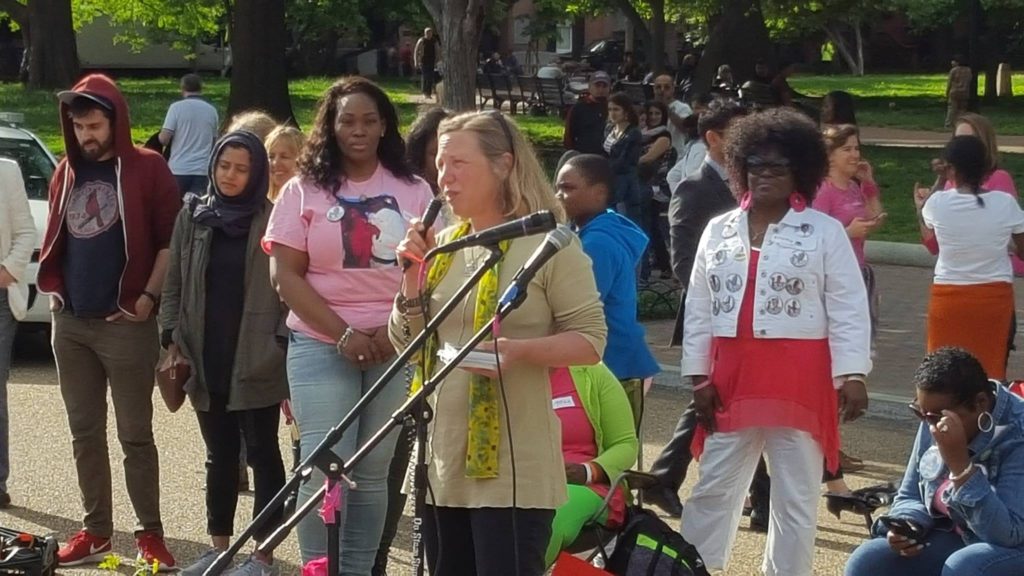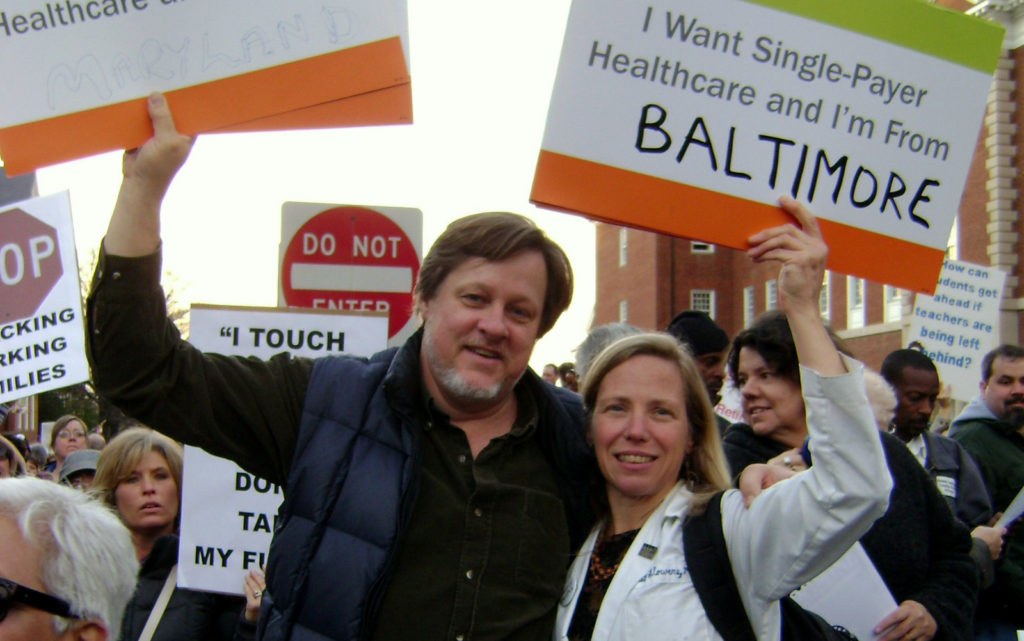Originally published at MintPress News.
BALTIMORE — A pediatrician and activist from Maryland who’s running for the U.S. Senate says it’s time for Americans to demand a voice in government.
“This seems like a really important time to start to build a political alternative that’s the opposite of what the two corporate parties are,” Margaret Flowers told MintPress News.
In January, a Gallup poll showed that fewer Americans identify with either major political party than at almost any other time in history. And voters seem increasingly interested in third-party candidates, with Google searches for both Jill Stein and the Libertarian Party seeing a marked increase in recent months.
“The Democratic and Republican parties are dying. They’re at the smallest stage that they’ve ever been and the majority of people are rejecting them, becoming independent or becoming members of other parties,” Flowers, who also occasionally contributes analysis and reporting to MintPress, said.
On May 1, Flowers accepted the Green Party nomination for the seat vacated by Barbara Mikulski, a Democratic incumbent who is retiring from the Senate after five terms in office.
Baltimore residents have grown increasingly politically organized and empowered since the protests that occurred in the wake of the death of Freddie Gray, a black man who died after a violent arrest last summer, and Flowers sees her nomination as a chance to promote a political party “that can work hand in hand with social movements to get the change we need.”

Building a party ‘dedicated to social justice and grassroots democracy’
Gray’s death brought national attention to problems of wealth inequality and racial injustice that have long plagued the city of Baltimore, and Flowers believes the Green Party’s core values are closely aligned with this work.
Flowers said she’s inspired by the success of Kshama Sawant, a member of the Socialist Alternative party, who was elected to the Seattle City Council last year and helped pressure the city to adopt a $15 an hour minimum wage.
“We have to build up a party that is the alternative we want to see, that really is dedicated to social justice and grassroots democracy,” Flowers said.
Flowers and the Baltimore Green Party are part of the Coalition for the Transformation and Betterment of Baltimore, a coalition of dozens of local organizations which supports community organizing.
While she’s supportive of the Green Party’s national agenda and its presidential nominee, Jill Stein, Flowers is primarily focused on building local political power. “It’s really organizing within neighborhoods to empower them to look at what their needs are look at what their resources are and look at how we can harness all of that,” she explained.
She said the Baltimore Green Party is creating a shared social justice platform for all their candidates which could have a national impact: “We’re trying to pull the best of everything around the country and around the world and put together a real comprehensive agenda that we hope that others will pick up and use where they live.”
Flowers is a participant in Black Lives Matter protests, as well as movements against U.S. war crimes andfossil fuels. She also serves as co-director of Popular Resistance, which organizes and reports on protests throughout the United States.
She said activists offer an important alternative to career politicians:
We run for office because we see the crises that we face, we see the failure of the political parties to address them, and we want to represent the interests and the needs of the people that we work with.
She added: “Being grounded in activism is critical to being a candidate that’s going to be accountable to people because that’s what you’re used to as an activist: you work as a group, it’s not about you.“

Healing American politics
Both Flowers and Stein, her Green Party counterpart in the presidential race, were doctors before they became activists.
Last month, Stein told Abby Martin, host of “The Empire Files” on TeleSur English, that she sees politics as a way to address root causes of her patients’ illnesses.
“I used to say I practiced clinical medicine, now I say I practice political medicine, because it’s the mother of all illnesses,” Stein said. “And we have to fix this one if we’re going to fix the things that are literally killing us.”
Flowers also views activism during this election season as a way to target the societal injustices that cause illness and other forms of suffering. “As a physician, you see the symptoms of the problems that we face, and I don’t want to just treat symptoms, you need to get at the root causes of why we’re facing the issues that we face,” she told MintPress.
As one example, Flowers cited the high rate of childhood asthma in Baltimore, which she believes is caused by air pollution. In Baltimore, 20 percent of people under the age of 18 have asthma, nearly twice the national average of 9.4 percent.
“Both Jill and I recognize that in order to actually have a healthy population, which we don’t by any means in this country, especially compared to other industrialized nations, you can’t solve it by just treating the patients that come through your door and sending them back out into the same toxic environment.”
Flowers first entered activism as an advocate for health care reform before expanding her work to other, intersecting issues.
Her Senate campaign platform is focused on economic justice, racial justice, and environmental justice. “These three areas are intimately connected,” Flowers explained. “The roots are the capitalist economy, the U.S. being the largest empire in the history of the world and money in politics.”
‘The two major parties are wealth-dominated parties’
“If we want to change power and really begin to solve these problems, we have to change the underlying economy and wealth inequality,” Flowers said.
Flowers criticized mainstream liberal NGOs for collaborating too closely with the Democratic Party.
“They have no political power when they do that because the Democrats just take them for granted,” she told MintPress. ”The way you apply pressure is by building a third party that actually challenges the Democrats and makes them have to work for their votes.”
Flowers quoted former Supreme Court Justice Louis Brandeis: “We can either have democracy in this country or we can have great wealth concentrated in the hands of a few, but we can’t have both.”
“The two major parties are wealth-dominated parties that can’t represent the major interests of the people because they’re paid to represent the needs and interests of Wall Street,” she explained.
Flowers cited Baltimore politics as an example of the failings of the Democratic Party: “We’ve had almost 50 years of Democratic Party mayors and they’re all in bed with big finance and the property developers.”
And Chris Van Hollen, the leading Democratic candidate in the Baltimore Senate race, has raised over $8 million, with his largest donations coming from lawyers, the real estate industry, and corporations like Marriott Hotels.
If elected, Flowers said she hopes to serve regular people, not just the 1%.
“I’d love to win the Senate seat, and if I did you’re not going to find me on the telephone eight hours a day dialing for dollars or meeting with corporate lobbyists,“ she said. “My office is going to be a place where we push to get the solutions we need onto the table and then we build the pressure to get them passed.”
Although she recognizes the work of building a viable third party will be a lengthy process, she said America’s shifting political landscape gives her hope. “More and more this year we’re seeing people talk about the importance of alternative parties, so maybe they’re starting to get it,” Flowers said.
“I’ve seen that when people organize, they can set the agenda and win,” she concluded. “That’s what I want to do on a bigger scale.”